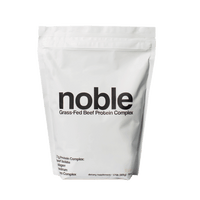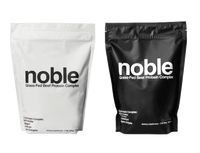
The Power of a Hormone Balancing Diet for Optimal Health
Share
Are you feeling off balance lately?
Hormones often play a significant role in our overall health. Research reveals that an imbalance of these chemical messengers can lead to weight gain, mood fluctuations, and fatigue.
Thankfully, this blog post explores the power of a hormone-balancing diet, offering insights on what to eat for optimal hormonal harmony.
Keep reading — you might find the key to your best health yet!
Key Takeaways
- A hormone-balancing diet can improve health. Eating protein-rich foods, healthy fats, and high-fiber carbs helps our hormones work better.
- Foods like eggs, fatty fish, leafy greens, avocados, and cruciferous vegetables are great for balancing hormones.
- Watch for signs of hormonal imbalance like fatigue, mood changes, or weight gain. This might mean your diet needs a change.
- Some foods can mess up our hormones. Reducing sugary snacks, processed foods, or alcohol can keep your hormones in check.
Understanding Hormonal Imbalance
Have you ever felt out of sync and just needed to be right?
It might be your hormones acting up, those sneaky chemical messengers buzzing around in your body playing a big game!
Let's grasp how these invisible vibe-setters work and learn the telltale signs that they might be off-balance.
Prepare yourself for an intriguing exploration of the intricacies of hormonal imbalance.
How hormones work in your body
Hormones are your body's internal communication system, connecting your body's various tissues and organs.
Endocrine glands, including the thyroid, pituitary, pancreas, and adrenal glands, are responsible for their production.
Once secreted into your bloodstream, hormones travel to specific cells or organs that bind with receptors.
This binding triggers a particular response in the target cell or organ - think of it like flipping a switch "on" for specific actions in your body.
These hormone-regulated actions cover a wide range: controlling metabolism and appetite, regulating mood swings and sleep patterns, managing stress responses, influencing growth and development during puberty - and even directing reproductive processes like ovulation and sperm creation!
Hormonal balance is essential to keep this complex web of interactions running smoothly.
In normal conditions, hormone production varies throughout the day following circadian rhythms.
Certain lifestyle factors can throw off this delicate balance, though – lousy diet habits being one primary culprit we’ll explore more later on!
So yes – those mysterious hormones play a massive role in keeping you healthy – if kept balanced right with some help from mindful eating habits, you'll learn about here!
Signs of imbalanced hormones
Imbalanced hormones may reveal themselves through a variety of physical and emotional signs.
Meat lovers and carnivore diet followers need to recognize these symptoms to help their bodies achieve optimal health through a hormone-balanced diet.
- Unexplained weight changes: You may experience sudden weight loss or gain without significant changes in your diet or lifestyle.
- Chronic fatigue: Prolonged feelings of exhaustion, despite getting enough sleep, might be another indication of hormonal imbalance.
- Skin issues include dry skin, acne breakouts, or other unexplained skin problems.
- Mood swings and anxiety: Hormonal imbalances often result in unsteady emotions like frequent mood swings or instances of anxiety and depression.
- Irregular periods: In women, irregular menstrual cycles can signal hormonal issues.
- Low libido: A common symptom of hormonal imbalance is a decreased sex drive, often linked with low levels of certain hormones.
- Symptoms of sleep disturbances: Challenges initiating or maintaining sleep may also indicate a hormonal imbalance.
- Constant hunger: If you're constantly feeling hungry even after eating enough protein-rich food, it could be your body's way of signaling an imbalance in hunger-regulating hormones.
- Digestive issues: Problems like bloating, constipation, diarrhea, or stomach cramps could indicate a problem within the digestive system, directly impacting hormone balance due to the gut microbiome's role in hormone regulation.
- Hair loss and thinning hair: Hormones play a significant part in the hair growth cycle; hence, imbalances might lead to unusual hair loss or thinning hair.
The Role of Diet in Hormone Regulation
Your eating habits are your body's hormone control tower. What you munch on daily can keep your hormones in harmony or toss them off balance—neglecting essential nutrients?
Your body may struggle to produce the hormones you need.
Are you overloaded with unhealthy foods? Hormone function could take a hit, raising your risk of weight gain, mood swings, and more.
From what lands on your plate to how often you eat - every choice matters for optimal hormone regulation.
Make the right ones!
How diet affects hormones
Your diet significantly influences hormone regulation. Protein synthesis, for instance, is facilitated by adequate protein consumption.
It also controls ghrelin, known as the hunger hormone, leading to a feeling of fullness that can prevent overeating and subsequent weight gain.
The foods you eat can also affect insulin levels and sensitivity.
Due to their effect on this vital hormone, diets high in added sugars have been associated with insulin resistance, obesity, and diabetes.
Even gut health is tied to hormone regulation, with an unhealthy gut potentially giving rise to insulin resistance issues while impacting feelings of satiety or fullness.
So, not just what you consume but how your body breaks it down can influence hormonal balance!
Nutrient deficiencies that can impact hormones
Nutrient deficiencies can throw your hormonal balance off gear, especially if you're following a carnivore diet. Here's what you need to look out for:
- Protein deficiency: Protein aids in hormone production and regulation. Meat lovers, rejoice! This is your chance to dig into steak, chicken, and fish.
- Omega-3 fatty acid deficiency: These healthy fats are essential to hormone health. Find these in foods like fatty fish or omega-3 supplements as part of a carnivore diet.
- Low intake of Zinc: This mineral is crucial for producing hormones such as insulin and testosterone. Shellfish and beef are great sources to boost your zinc levels.
- Vitamin D scarcity: The "sunshine vitamin" helps regulate insulin and strengthens your immune system.
Best Foods for Hormone Balance

Chow down on protein-rich bites, feast on high-fiber carbs, and lavish your plate with healthy fats – it's not just about delighting your taste buds!
Each morsel plays a critical role in maintaining your hormone balance.
Remember to add eggs, fatty fish, leafy greens, cruciferous veggies, and avocados - star performers in this harmonious symphony of nutrition.
Your health will thank you for making these power-packed foods the rockstars of your carnivore diet!
Protein-rich foods
Protein-rich foods play a vital role in hormone regulation in the body. These foods, such as lean meats or legumes, support the production of peptide hormones.
Your metabolism gets a boost when devouring these hearty meals, assisting in weight control and more efficient calorie burn.
The nutrient-packed protein diet also aids in controlling your hunger by suppressing ghrelin - the infamous hunger hormone.
So, if you're aiming to lose weight or keep those pesky cravings at bay, include more protein-rich foods!
High-fiber carbohydrates
As part of a hormone-balancing diet, high-fiber carbohydrates are crucial in stabilizing your blood sugar.
This becomes crucial for carnivores trying to maintain optimal hormone health.
In addition to providing immediate energy, a fiber surge significantly improves gut health by promoting the development of beneficial gut bacteria.
Furthermore, incorporating high-fiber carbs into meals can assist with weight control, another important aspect when discussing hormone balance.
Healthy fats
Healthy fats are essential for maintaining hormonal equilibrium. These include animal and monounsaturated fats, often found in avocados, olives, and nuts.
Consuming these can nourish your hormones and reduce insulin resistance - the stepping stone to health issues like diabetes.
Your body also needs omega-3 fatty acids for optimal hormonal function. They are primarily present in fatty fish like salmon or supplements if you're not big on seafood.
Don't be swayed by the misconception that all fat is wrong – it's about choosing the right kinds of fat!
An essential tip for carnivore diet lovers: opt for grass-fed meat as it typically has a higher nutrient profile, including these beneficial fats essential to hormone health.
Eggs, Fatty Fish, Leafy Greens, Cruciferous Vegetables, Avocados
Take control of your hormone health with a carnivore-friendly diet. Chow down on these five essential foods that play a vital role in balancing hormones.
- Eggs: Remember to complete the yolk! Eggs are rich in protein and impact insulin and ghrelin hormones positively. This results in better blood sugar stabilization and hunger management.
- Fatty Fish: Omega-3-rich fish like salmon, mackerel, and sardines keep hunger pangs at bay by stabilizing hunger hormones. What's more, they can boost female testosterone levels, enhancing energy and well-being.
- Leafy Greens: Get your fill of spinach, kale, and Swiss chard to strike a balance with your hormones. These greens reduce stress by lowering cortisol levels while facilitating estrogen balance.
- Cruciferous Vegetables: Think broccoli, cauliflower, cabbage, and Brussels sprouts. These veggies detoxify the body from excess estrogen—a key player in weight gain, mood swings, and sleep disorders.
- Avocados: This versatile superfood is good for more than just guacamole dips! Avocados can influence estrogen and progesterone—the hormones responsible for regulating ovulation and menstrual cycles.
Foods to Avoid for Hormone Balance
Certain foods can wreak havoc on your hormone balance. These include:
- Sugary snacks and drinks: Overconsumption of sugar leads to hormone imbalances, causing mood swings, energy crashes, and anxiety.
- Processed foods: Often high in unhealthy fats and sugars, these foods contribute to hormone disruption.
- Artificial sweeteners: Not only do artificial sweeteners mess with your taste buds, but they can also negatively impact your hormones.
- Alcohol: While a glass of wine may seem harmless, excessive consumption can lead to mineral deficiencies impacting hormone production.
- Pesticide-heavy fruits and vegetables: You love your greens, but the pesticides sprayed on them may disrupt your hormonal harmony.
Lifestyle Factors that Influence Hormone Balance
Listen up! Your decision-making process has an essential impact on your hormone balance.
Yes, that's right - regular exercise doesn't just tone your muscles but also helps maintain hormonal harmony.
But that's not all - reducing stress is vital, too. Have you ever noticed how tense situations leave you frazzled? That's hormones at work!
Lastly, never underestimate the power of good sleep - it isn’t called 'beauty rest' for nothing.
So lace up those sneakers, embrace calmness, and catch plenty of Z’s to keep those hormones in check!".
Importance of regular exercise
Regular exercise holds immense significance in the realm of hormone balance.
Not only does it enhance hormone receptor sensitivity, but it also raises insulin alertness, helping to fend off risks associated with diabetes and obesity.
Don't sit around too much! A sedentary lifestyle can be a grand invitation to hormonal imbalances.
Maintain hormonal balance by participating in regular physical activities like walking, running, or weightlifting.
Another bonus: the fitness you gain through regular workouts helps keep weight in check - an essential factor for maintaining optimal hormonal equilibrium.
Therefore, exercise on a treadmill or dedicate some time to yoga; your hormones will appreciate it.
Stress reduction techniques
Stress reduction is one of the key lifestyle factors that can significantly influence your hormonal balance.
Here are several strategies that might prove effective for meat lovers and carnivore diet followers:
- Engage in Regular Exercise: A consistent workout suits your muscles and improves hormone receptor sensitivity. This lowers insulin levels and enhances insulin sensitivity, decreasing the likelihood of developing diabetes, obesity, and cardiovascular disease.
- Establish a Consistent Sleep Schedule: Stress reduction and restful sleep are interdependent. An imbalance of hormones may result from elevated cortisol levels caused by chronic stress.
- Practice Mindful Eating: Concentrating on the foods you consume when stressed plays a significant role in maintaining hormonal balance.
- Use Relaxation Techniques: Techniques such as yoga, deep breathing, meditation, or a relaxing bubble bath have reduced stress-related hormones.
- Cut Down on Added Sugars: Lowering sugar intake is vital for optimizing hormone function and avoiding health issues such as obesity and diabetes.
- Maintain a Moderate Weight: Weight gain can increase insulin resistance and cause hormonal imbalances. Therefore, keeping a balanced weight is essential.
- Nurture Your Gut Health: A healthy gut microbiome aids significantly in hormone regulation by modulating insulin resistance and feelings of fullness.
The impact of sleep on hormones
Inadequate sleep quality and sleep deprivation can irreparably damage hormonal equilibrium.
A good night's rest helps regulate essential hormones like growth hormone, vital for tissue repair, and cortisol often called the stress hormone.
Without enough slumber, these hormones may become imbalanced, leading to increased appetite and weight gain-related complications.
Moreover, insufficient sleep might trigger insulin resistance, which is a precursor to several metabolic disorders, including diabetes.
Focus on proper sleep hygiene to maintain optimal hormone balance and safeguard overall health.
Committing to adequate quality and quantity of shut-eye ensures that your body operates smoothly as you continue your carnivore diet.
Sample Hormone-Balancing Meal Plan
Curating a hormone-balancing meal plan can be a game-changer for your health.
As a meat lover or follower of the carnivore diet, you can enjoy nutrient-dense meals that support hormone health.
Here's a sample plan:
| Day | Breakfast | Lunch | Dinner |
|---|---|---|---|
| Monday | Scrambled eggs with spinach | Grilled chicken salad with mixed greens | Grilled lamb chops with steamed broccoli |
| Tuesday | Bacon and eggs | Beef steak with a side of asparagus | Baked salmon with a leafy green salad |
| Wednesday | Omelette with peppers and onions | Pork chops with cucumber salad | Grilled fish with steamed vegetables |
| Thursday | Sausages with grilled mushrooms | Ground beef with avocado salad | Roast chicken with brussels sprouts |
| Friday | Scrambled eggs with cheddar cheese | Ribeye steak with mixed salad | Grilled trout with steamed greens |
| Saturday | Ham and eggs | Tuna salad | Slow-cooked beef brisket with steamed vegetables |
| Sunday | Bacon and avocado | Grilled chicken thighs with leafy green salad | Roast turkey with steamed broccoli |
This meal plan prioritizes protein-rich foods essential for producing protein-derived hormones.
Your body will thank you for the nutrient-dense meals, aiding in hormone regulation and maintaining a moderate weight crucial for hormonal balance.
With this plan, you're well on the path to achieving optimal health.
Conclusion
Embrace the power of a hormone-balancing diet for optimal health. Let protein-packed meals keep your hormones in harmony and enhance your overall well-being.
Start investing in your health today, defy imbalances, and experience how rewarding it can be to eat mindfully for hormonal balance.
FAQs
What is a hormone-balancing diet?
A hormone-balancing diet involves eating foods that help balance hormones for optimal health. This includes the best foods for hormone balance, like those rich in protein, Omega-3, and Omega-6.
Can food affect hormonal balance?
Yes! What you eat significantly impacts your hormonal balance. Foods to eat to balance hormones include low glycemic index items, which help regulate blood sugar and hormone levels.
How can a Hormone Balance Diet aid metabolic rate?
Protein-rich foods in the Hormone Balancing Diet can enhance your metabolic rate since proteins require more calories to digest than carbohydrates or fat.
Why are fatty acids essential in a Hormone Regulation Diet?
Essential Fatty Acids like Omega-3s found in some foods are building blocks in producing hormones, thus making them essential for maintaining hormone health.
How does sleep deprivation affect one's hormonal health?
Sleep deprivation can disrupt hormone regulation, leading to imbalances that may impact appetite control, mood regulation, and even reproductive health.
Can dietary changes alone resolve my hormonal imbalance issues?
While incorporating Best Foods for Balancing Hormones into your diet is highly beneficial, it should complement other lifestyle habits like regular physical activity and adequate sleep for full efficacy.



